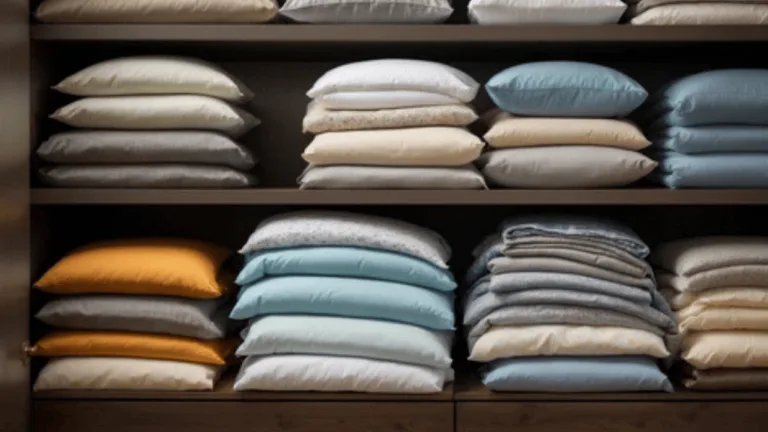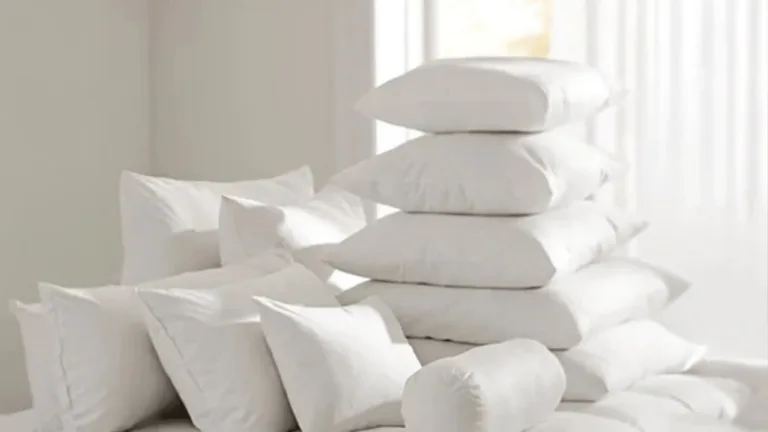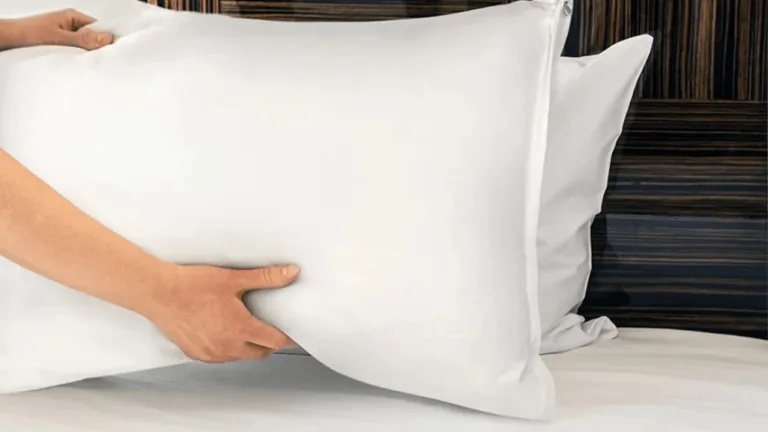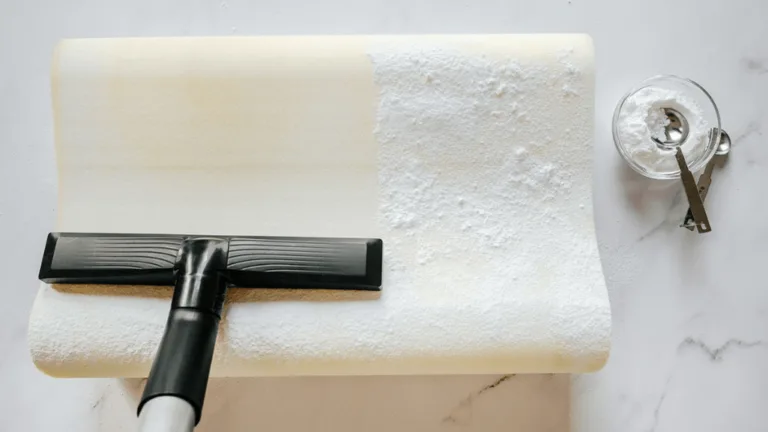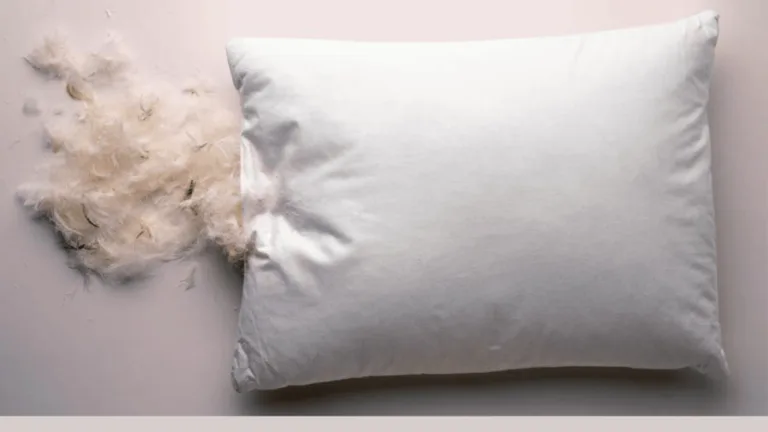Pillows add charm to our living spaces. Keeping them clean and pretty is key. Whether on your bed or sofa, they’re easy to refresh. This decorative pillow care guide will tell you how. It includes tips from the Peacock Alley Decorative Pillow Care Guide to keep your pillows clean and soft.
Key Takeaways
- Pillows with removable covers should be washed at least once a month.
- The filling inside pillows should be cleaned every other month at the least.
- Pillows made from delicate fabrics like silk and wool typically need dry-cleaning.
- Many throw pillows can be washed in a machine with a delicate cycle and mild detergent.
- Pillow stains should be pre-treated with a cleaning solution before washing.
- Weekly maintenance is recommended by spraying throw pillows with vinegar and tossing them into the dryer to remove dust mites and allergens.
Introduction to Washing Decorative Pillows
Have you ever thought about cleaning your decorative pillows? Yes, you can and you should. Washing them keeps your home looking fresh and your favorite cushions last longer. This is good for both their look and their cleanliness.
Different types of decorative pillows need different care. For pillows often used on sofas or beds, clean them once a month. For those seldom used, cleaning them seasonally is fine.
The best way to clean pillow covers is in a washing machine. Use mild detergent, cold water, and the gentle cycle. Air dry the covers to avoid shrinking or changing shape. Look for pillow covers that are safe to wash by machine for an easier time.
Pillows with beads, loops, or sequins need special attention. Hand-dust them because vacuuming might ruin their decorations. For tough stains, use enzyme-based stain removers before washing.
Taking care of pillow inserts is just as important. To clean them, put them in the dryer without heat and use dryer balls. If they are down, feather, or polyester, gently wash them in cold water and dry with wool dryer balls to prevent clumping.
| Fabric Type | Recommended Cleaning Method |
|---|---|
| Cotton, Linen | Warm cycle, mild detergent, air dry |
| Polyester, Faux Fur | Mild soaps or detergents, air dry |
| Velvet | Avoid water, dry cleaning solvent |
| Satin | Hand wash in cold water |
No matter how your pillows look or what they’re made of, you can keep them clean. Understanding the right cleaning method will make your home warm and lively. By using the right care, your decorative pillows will stay beautiful and last longer.
Reading Care Labels for Proper Washing Methods
It’s important to know how to care for your decorative pillows to keep them looking good. Each one comes with instructions on the best way to wash it. If you don’t follow these guidelines, you might damage the fabric.
Importance of Care Labels
Care labels tell you if you can machine wash your pillow or not. They help keep delicate fabrics safe like silk or down feathers. Plus, following care instructions will make your pillows stay comfy and in shape for a long time.
Common Symbols and What They Mean
Understanding care symbols is easy and can save your pillows. Let’s look at the meanings behind some common symbols:
| Symbol | Meaning |
|---|---|
| Machine Wash | Indicates the pillow is a machine washable decorative pillow, often suggesting use of the delicate cycle. |
| Hand Wash | Signifies that the pillow should be gently cleaned by hand to prevent damage. |
| Dry Clean | Denotes the pillow must be taken to a professional cleaner, particularly for fabrics like silk and velvet. |
| Do Not Wash | Indicates the pillow should only be spot cleaned or professionally cleaned without water. |
| Do Not Bleach | Advises against using bleach, which can degrade fabric quality and color integrity. |
| Air Dry | Recommends allowing the pillow to dry naturally, away from direct sunlight to prevent fading. |
By knowing these symbols and paying attention to care labels, you can protect your decorative pillows. With proper care, they will keep their luxurious look.
How Often Should You Wash Decorative Pillows
Keeping your decorative pillows clean is key for a neat living space. The amount you should wash them depends on how much they’re used and how dirty they get. Follow these tips for washing decorative pillows to make your home look and feel better.
Frequency for Pillow Covers
Wash removable covers once a month. This keeps your home looking good and cuts down on allergens. By using these tips for washing decorative pillows, you’ll keep your home comfortable for everyone.
Frequency for Pillow Inserts
Inserts need cleaning every two months at least. This keeps the pillow’s shape and the space clean. It’s especially important for foam inserts that have to be hand-washed.
Following these washing schedules will make your home healthier. It keeps your pillows fresh and your space looking its best.
Checking If Your Decorative Pillows are Machine Washable
To know if your pillows can go in the wash, start by looking at what they are made of. Understanding the kind of fabric is key. Then, be sure to use the right cleaning methods. Doing this keeps your pillows looking good and lasting longer.
Materials and Fabrics
Different pillows need different kinds of care. For example, if your pillows are made of silk, wool, or down feathers, they should be dry-cleaned. But if they’re made of foam or another washable material, they can likely go in the machine or be hand washed. Remember, foam pillows shouldn’t be machine washed. Instead, clean them in a sink or a bathtub. Also, always check a small hidden part of the fabric before using any cleaning products on it. This quick check is to make sure the product won’t damage the fabric.
Washing Machine Settings
Using the right washing machine settings is very important. Front-loading machines that don’t have a part called an agitator are ideal. They’re gentle and can help avoid damaging the pillow. When it comes to the wash cycle, use something gentle or delicate with cold water. Always make sure there’s not too much or too little in the machine. Balancing your load is crucial. Following these steps will maintain your pillows’ shape and softness.
| Material | Cleaning Method |
|---|---|
| Silk, Wool, Down Feathers | Dry Clean |
| Foam Inserts | Hand Wash |
| Linen | Warm Cycle, Mild Detergent |
| Satin | Hand Wash, Cold Water |
| Polyester Inserts | Gentle Cycle, Minimal Detergent |
Pre-Treating Stains on Decorative Pillowers
To get rid of stains on decorative pillows, start by pre-treating them. This step is vital because it helps avoid damage to the fabric. Plus, it gets rid of the stains you don’t want. Here are some top tips for washing these pillows.
Spot Testing
It’s crucial to do a spot test before cleaning. This step makes sure the cleaner won’t harm the fabric. Simply dab a bit of the cleaning solution on a hidden area of the pillow. If the fabric doesn’t react badly, you’re good to clean the stain.
Effective Cleaning Solutions
The right cleaning solution is important for removing stains. Light stains can often be cleaned with a mix of mild detergent and water. For tougher stains, like wine or grease, white vinegar or baking soda might do the trick. Just be sure the cleaner matches the fabric. Soft fabrics may need professional cleaning. And some foam pillows might just need a gentle hand wash.
For more info, the Peacock Alley Decorative Pillow Care Guide is a great resource. It offers tips on how to care for and wash decorative pillows. By following these tips, you can keep your pillows looking their best for longer.
Can You Wash Decorative Pillows
Wondering if you can wash decorative pillows? The answer is yes! Many can be washed, which keeps them looking good longer. Knowing how to wash them right makes the difference. This means following the decorative pillow care guide for your pillow’s type.
- Pillows with decorative, removable covers should be washed at least once a month.
- The filling inside decorative pillows should be cleaned every other month.
- Pillows made from delicate fabrics like silk and wool typically need to be dry-cleaned.
- Tips suggest using warm water on a delicate cycle with mild detergent to wash pillow inserts.
- After washing, hang the inserts to dry until they are about 75% dry, then fluff them in the dryer on a ‘no heat’ setting.
- Some throw pillows may benefit from light sponge cleaning with upholstery shampoo for stain removal.
If your pillow is suede, leather, silk, or wool, don’t wash it with water. For these, it’s best to let a professional clean them without water. But, foam pillows are fine to clean by hand. Use warm water and a little detergent in a sink or bathtub.
Keeping your throw pillows clean is important. Regular cleaning helps them stay fresh. This includes spot cleaning and deep cleaning monthly. Most pillows have removable covers that you can wash in a machine. If not, wash them by hand.
Now you know taking care of your pillows is doable. Following these simple steps keeps your home’s decor looking great and clean.
Hand Washing Tips for Delicate Decorative Pillows
For pillows too delicate for machines, hand washing is the way to go. It keeps them looking elegant and feeling soft. Knowing the right way to clean decorative throw pillows by hand is key. This helps preserve their beauty and lifespan.
Required Materials
- Mild detergent
- Large basin or sink
- Soft brush or cloth
- Cold water
- Well-ventilated drying area
Step-by-Step Hand Washing
- Prepare the solution: Begin by filling a basin or sink with cold water. Add a bit of mild detergent. It should sud up a little but not be too soapy.
- Soak the pillow: Put the delicate pillow in the water. Gently move it around. Let it soak for 10-15 minutes. This time helps to clear away dirt and oils.
- Gently scrub: If there are stains, a light scrub with a soft brush or cloth can help. Just don’t scrub too hard. You don’t want to damage the fabric.
- Rinse thoroughly: Remove the soapy water and add fresh, cold water. Rinse the pillow well. Keep rinsing until the water is clear.
- Press out excess water: Squeeze the pillow gently to get rid of water. Be careful not to wring it. Wringing can mess up its shape.
- Dry the pillow: First, wrap the pillow in a clean, dry towel to soak up more water. Then, hang it up to air dry. Make sure it dries in a shady spot to protect the fabric.
Using these steps, you can give your delicate pillows the care they need. Remember, you should also vacuum and dust them monthly. If you use your pillows a lot, washing the covers every few weeks is wise. Need more tips on cleaning decorative throw pillows? Check out Spiffy Spools. They have a huge selection of colors and patterns for custom covers and throw pillows.
Dry Cleaning Instructions for Special Fabrics
Cleaning decorative pillows made from silk and wool needs special attention. Dry cleaning is often best for them to keep them beautiful. These materials are delicate and must be handled carefully.
- Always read the care label first. If it says dry cleaning, it’s a must to prevent damage.
- For the best results, let professionals handle it. Places like Hangers Cleaners are great for pillows with complicated designs or covers you can’t remove.
- A light sponge cleaning can work for small stains. Remember to test a hidden part first to avoid any fabric damage.
- Home dry-cleaning kits are also an option. They are convenient and safe for use on materials like silk and wool.
It’s vital to keep materials like suede, leather, silk, and wool away from water. Dry cleaning these ensures they stay clean and keep their luxury look.
Dust or vacuum your pillows regularly to keep them in good shape. This makes them look newer for longer, in between dry cleanings.
Using a Washing Machine to Clean Pillow Inserts
Looking into how to clean decorative throw pillows? A front-loading washer for the inserts is a smart move. It’s both efficient and safe. Following certain steps keeps the pillows in good shape while cleaning them well.
First, check the care labels on your pillow inserts. This confirms it’s okay to wash them in a machine. For the best outcome, use a gentle cycle with warm water and mild detergent. This keeps the pillows looking good without harming them. Here’s the correct way to wash them:
- Remove Removable Covers: If you can take the covers off, wash them following their own care instructions.
- Pre-Treat Stains: Test any stain remover first on a hidden spot. This makes sure it won’t hurt the fabric.
- Load the Machine: Put the inserts in the washer. Make sure they’re not lopsided. Washing two at a time often evens out the load.
- Set the Machine: Choose a gentle cycle with warm water. Use a mild detergent. Don’t use hot water; it might misshape the pillows.
- Post-Wash Drying: After the wash, air-dry the pillows until they’re about 75% dry. Then, put them in the dryer with dryer balls on a ‘no heat’ setting to finish drying and fluff them up.
Keeping your inserts clean regularly fights dust mites and reduces allergens. It makes your home healthier. It’s good to wash pillow inserts every two months. This helps them last longer and stay looking nice. Knowing how to clean decorative throw pillows means your pillows will be fresh and cozy for a long time.
Drying Decorative Pillows: Air vs. Machine Drying
To keep decorative pillows fluffy and in shape, it’s important to dry them right. You can choose between air drying and using a machine. Both ways have good points. Let’s look at how to dry decorative pillows well.
Air Drying Techniques
Air drying suits many decorative pillows, like those with silk or wool. To air dry, follow these steps:
- Place pillows on a flat, ventilated surface outdoors or in a breezy spot inside.
- Turn them every now and then for even drying.
- Avoid long sun exposure to stop fading.
These steps protect your pillows, keeping them at their best shape.
Machine Drying Tips
Sometimes, using a machine to dry can be a good option. Here’s how to do it right:
- Check if the care label recommends machine drying.
- Use the lowest heat setting to avoid fabric and filling damage.
- Throw in some clean tennis balls to keep pillows from clumping.
- Take them out when they’re mostly dry, fluff them, then finish drying them in the air.
| Drying Method | Benefits | Considerations |
|---|---|---|
| Air Drying | Gentle on fabrics; prevents shrinkage | Takes longer; requires a ventilated space |
| Machine Drying | Faster drying; can fluff up fillings | Risk of fabric damage if heat setting is high; check care label |
Picking the right drying method will keep your pillows fresh. This also helps in maintaining your home’s cleanliness and comfort.
Keeping Your Decorative Pillows Fresh Between Washes
Keeping your decorative pillows clean and fresh is important. It helps them last longer and keeps your home smelling nice. You don’t have to deep clean them often. There are simple ways to ensure they stay inviting.
- Vacuuming: Vacuums can get rid of dust and dirt on your pillows. Use a soft brush on your vacuum so you don’t ruin the fabric.
- Spot Cleaning: If something spills, clean it right away. Use a damp cloth with a little detergent to gently blot the spot. Test the solution on a hidden part of the fabric first.
- Vinegar Sprays: A spray of water and vinegar can remove bad smells and kill germs. Mix one part vinegar with three parts water in a spray bottle. Then, lightly spray your pillows once a week.
- Tennis Balls in the Dryer: Place a few tennis balls in the dryer with your pillows once a month. Use the ‘no heat’ setting. This will help fluff up your pillows and keep them in good shape.
- Airing Out: Every month, keep your pillows outside in the shade for a few hours. This will make them feel and smell fresher.
By following these suggestions, you can ensure your decorative pillows look great and smell fresh. Regular simple steps are often more effective than a big clean-up now and then. These methods are a good fit for various pillow types and materials.
| Maintenance Activity | Frequency | Considerations |
|---|---|---|
| Vacuuming | Weekly | Use a soft brush attachment |
| Spot Cleaning | As needed | Perform a colorfastness test first |
| Vinegar Sprays | Weekly | Use a diluted solution |
| Tennis Balls in the Dryer | Monthly | Use ‘no heat’ setting |
| Airing Out | Monthly | Avoid direct sunlight |
Storing Decorative Pillows When Not in Use
Keeping your decorative pillows in good shape is key. With a solid decorative pillow care guide, you can keep your pillows looking great. This is even when you’re not using them all the time.
Using vacuum-sealed bags is a smart way to store them. These special bags make the pillows take up less space. They also keep pillows safe from dust and moisture. It’s a great approach for those with not much storage room. You can easily keep them under beds or in closets.
Store your pillows in trunks, baskets, or dressers for fast access and care. It’s important that the storage spot isn’t damp. This helps prevent mold. Placing cedar blocks with pillows in a linen closet keeps bugs away and adds a nice smell.
For pillows made of delicate materials like silk, avoid harmful storage conditions. Breathable cotton bags protect them without causing damage. If storage space is a concern, organizing them in a special closet can keep things tidy. This is important for maintaining your home’s organization.
Here’s a summary table from the decorative pillow care guide. It shows the best ways to store pillows depending on what they’re made of:
| Material | Recommended Storage |
|---|---|
| Cotton | Vacuum-sealed bags, linen closets |
| Silk | Breathable cotton bags, dry trunks |
| Wool | Well-ventilated shelving, cedar block protection |
| Foam | Vacuum-sealed bags, dressers |
| Suede | Breathable bags, moisture-free areas |
By following these tips from the decorative pillow care guide, your pillows will always look lovely. This way, they’re ready to make your home beautiful whenever you need them.
Conclusion
Keeping your home decor looking great means taking good care of your decorative pillows. This guide has all you need to know on how to maintain different types of pillows. Whether it’s satin, velvet, linen, or faux fur, we’ve covered the right way to clean them.
How often you clean your pillows makes a big difference in how long they last. It’s good to wash pillowcases every week or two, and the decorative pillows every 3 to 6 months. Doing this will keep them looking and feeling fresh. Don’t forget to fluff them up daily and give them a good vacuum every few months.
If you or your family members have allergies, you should change your pillows at least every six months. This keeps the air in your home healthier. When washing, consider air-drying them. This helps to keep the pillows’ shape and avoids mildew.
Using a mesh bag in the washer also protects the pillows from the machine’s roughness. Taking good care of your pillows not only makes your home look better. It also helps keep your place comfy and welcoming. By following these tips, you’ll be on your way to a snugger, tidier home.





